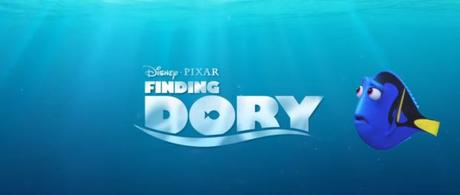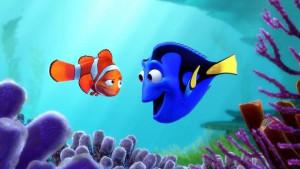
Last month, ABC received plenty of positive notices over its decision to pick up Speechless, the latest in its ongoing line of diversity-oriented family sitcoms (e.g., Blackish, Fresh Off the Boat, The Real O'Neals). This one stars Minnie Driver as the fiercely driven mother of a special needs child, and the pilot explores how her devotion to caring for her cerebral palsy-suffering son impacts her husband and younger two children. Popsugar, among others, have called this "groundbreaking," another example of the way the TV industry seems to try much harder to reflect the real world than Hollywood movies.
Animation is a different story, though. Through the anthropomorphized mouths of cute little animals ( Zootopia), Disney Animation Studios tricked us earlier this year into watching a surprisingly mature reflection on racial profiling and the unconscious ways we internalize racism. Now, through the familiar character of Dory Pixar has delivered a deceptively incisive examination of the life of a special needs family. It's just not as explicitly about that as Speechless, and thus does not as obviously warrant special mention. However, buried beneath Finding Dory 's zany adventure trappings, standout vocal performances and reliably breathtaking visuals is the story of a character who learns to overcome her disability and the parental figures who have to trust her ability to do so.
This caught me off guard, not so much because I forgot how ambitious a Pixar movie can be but because I misunderstood Dory's backstory in Finding Nemo. I thought the joke was that since certain fish in the real world have remarkably short term memories (or at least we commonly think they do) specific breeds of fish in the fictional world of Finding Nemo suffer the same fate. Thus, surely Dory's short-term memory loss was an affliction common to all blue tang fish in both Nemo and Dory.
Wrong. The opening scene of Finding Dory introduces us to Jenny (Diane Keaton) and Charlie (Eugene Levy), both blue tangs with perfectly normal memories. The scenario at hand is immediately apparent: this is a husband and wife teaching their special needs child, a young version of Dory (voiced quite adorably by Sloane Murray), all the extra skills they'll need to survive in the world.
Dory's taught a standard introduction to use when she meets new people ("Hi, I'm Dory, and I suffer from short-term memory loss"). Difficult concepts are made easier to understand through catchy songs, such as a little diddy about staying out of the undertow. Her parents are ever patient and caring with her, never showing their anger or frustration. Of course, they understandably cry and worry if their daughter will ever be able to survive on her own in the world, but they do so only in private and when Dory is supposed to be sleeping.
One evening Dory accidentally slips into the undertow which sweeps her away and leaves her wandering the ocean alone, politely asking for help finding her parents before quickly (and quite tragically) forgetting all about them or what exactly she needed help with. One day she hears Merlin (Albert Brooks) yelling about some boat stealing his son Nemo (Hayden Rolance), and we know how that story played out.
As crushing Pixar sequences go, this isn't exactly on par with the opening of Up, ending of Toy Story 3 or "Take her to the moon for me" in Inside Out. However, it deftly establishes Finding Dory's placement in relation to Nemo, and reshapes the way we have to look at Dory, a character whose funny short-term memory loss quirk from the first movie is actually a central flaw which makes her a tragic character in the second movie.

The plot - in response to certain trigger words and sights, Dory starts to remember her parents and is desperate to find them - kicks in quickly, but it's initially just another road trip story, with cameos from Nemo favorites like the surfer dude turtles. Dory's all impulse and forward-movement; Merlin's all nervousness and chasing after Dory to make sure she doesn't get hurt. The new wrinkle this time: Nemo is with them, pushing his dad to ease up on his over-protective ways.
Once the trio is separated, Finding Dory starts to feel a bit more like its own movie. Dory ends up in the Marine Life Institute, a fish and ocean life conservatory, where she forges compelling new friendships with a group characters who suffer similar central flaws. Hank (Ed O'Neil) is a surly octopus whose lost one of his tentacles and wants to hide away in a fish tank for the rest of his life. Destiny (Kaitlin Olson) is a giant whale who can't see very well and constantly bumps into the walls in her exhibit. Bailey is a beluga whale short on self-confidence, certain that an accident has left him incapable of utilizing his sonar abilities. Meanwhile, Merlin and Nemo try to find a way into the Institute, and encounter several funny new characters along the way.
These separate paths to the same destination shake up the character pairings, and while Merlin amusingly plays off some lazy sea lions Hank and Dory ultimately steal the show as perfect foils, his withering in the face of adversity nicely budding up against her endless optimism. The central dynamic of him always being more aware of imminent danger than her is a bit familiar, but played beautifully, especially by O'Neil, who is perfectly cast.
What's truly interesting is the way Dory becomes a source of inspiration, not just for others but for herself. The second half of the film repeatedly throws out the mantra "What would Dory do?", reflecting the way her determination to overcome the odds and live with her disability motivates her friends to try harder and do better. Obviously, it is no mistake that the majority of the film takes place at an Institute devoted to rehabilitating and releasing fish into the wild, showcasing one broken character after another who has to learn to soldier one.
If there is a glaring flaw it is that the solution to the central search seems so initially jarring I was sure it was a dream sequence ala The Good Dinosaur. Moreover, while O'Neil is an absolutely lovable curmudgeon the script continually uses Hank's octopus abilities like a sonic screwdriver, i.e., the quick and easy solution to nearly all of of the logistical problems, regardless of whether or not it makes sense. The final act, in particular, probably goes too far with this kind of thing, but, hey, it made me laugh.
THE BOTTOM LINEAs I wrote about in my Zootpia review, animated films have a long history of giving us "anthropomorphized outcasts who must overcome the restrictions of their societies or even species to realize their impossible dreams." However, Dory's different. She's not some elephant with giant ears which ultimately turn into her greatest strength. No, she is a character who's every single moment is a fight to retain what she knows she's about to lose, and while Finding Dory finds endless new ways to find the humor in that it also explores the tragedy of it as well in a way that ends up feeling oddly uplifting. Those who love her will never stop worrying about her because that's their job, but she'll never stop trying because that's who she is. That Pixar wrapped all of that up in such a consistently amusing, often laugh-out-loud funny story makes for a dang good film, far better than any spin-off/sequel 13 years removed from its predecessor should be.
ROTTENTOMATOES CONSENSUS95% - "Funny, poignant, and thought-provoking, Finding Dory delivers a beautifully animated adventure that adds another entertaining chapter to its predecessor's classic story."

